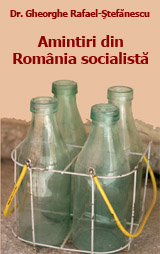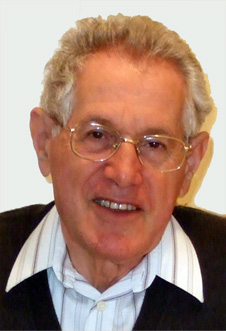Despre Autor
- Scurtă biografie (English version below)
S-a născut în 1938, într-o familie înstărită
din Deva. Tatăl, avocat, a decedat în 1942, iar restul familiei se mută la sat,
unde copilul devine fascinat de experienţele unei lumi noi.
Mama este persecutată de regimul comunist ca
fost “element chiabur” şi într-un final întreaga avere îi este confiscată,
pensia de urmaş fiindu-i şi ea anulată. Rămasă fără mijloace de întreţinere,
mama se mută la o soră care locuia la Arad, pentru a învăţa croitorie.
Copilul rămâne la
internatul şcolii din comună, devenind elev fruntaş şi ulterior este ales şeful
unităţii de pionieri. Persecuţia mamei continuă, iar în 1952 întreaga familie
este trimisă cu domiciliu obligatoriu la Aiud.
Fiind împiedicat de autorităţi să-şi
continue studiile, tânărul de 14 ani este nevoit să lucreze “la negru” pentru
asigurarea existenţei. Se angajază ca muncitor ucenic la Cooperativa “Oţelul”,
unde ajunge de-a lungul anilor, controlor de calitate. Ca muncitor însă,
reuşeşte să intre la liceu la “fără frecvenţă” şi ia bacalaureatul.
În 1956 este admis la
Facultatea de Medicină din Cluj, dar in anul 3 este exmatriculat din cauza
“situaţiei economico-sociale a părinţilor”. Se tocmeşte fochist la o fabrică de
produse făinoase şi ulterior este obligat să se întoarcă la Aiud, unde lucrează
pe un şantier ca muncitor necalificat.
După un alt an este
acceptat la Scola Sanitară din Arad, unde se admiteau şi “cetăţeni de categoria
a treia”. Absolvind al doilea din clasă, este repartizat ca asistent medical la
aeroportul din Constanţa.
În acelaşi an
(1962) este readmis la Facultatea de Medicină , de această dată în Bucureşti,
fiind nevoit să reînceapa studiile din anul întâi. În paralel continuă să
lucreze în diverse domenii, pentru a se întreţine.
Spre sfârşitul facultăţii se căsătoreşte;
vor urma doi copii, specializarea şi alţi cinci ani ca asistent universitar în
Bucureşti.
Când însă admiterea
la un examen pentru avansare profesională îi este blocată de Comitetul de Partid
din cauza originii “nesănătoase”, hotărăşte împreună cu soţia să părăsească ţara
definitiv. Este transferat pe “linie moartă” la “Policlinica pentru Sportivi”
unde întâlneşte şi alţi “indezirabili”; face gărzi de noapte pe “Salvare”.
Cererea de emigrare a
familiei este respinsă în mod repetat, iar autorităţile române transmit
avocatului american care se ocupa în mod voluntar de caz, că de fapt familia
nici nu ar fi înaintat vreodată o astfel de cerere.
Deabea
în 1980, după trimiterea în occident (printr-un turist) a celor cinci
răspunsurilor negative de la directia Paşapoartelor, familiei îi este aprobată,
în final, emigrarea.
About the Author
Gheorghe Rafael-Stefanescu
(1938- ) was born into a family of a well-to-do lawyer and a homemaker mother in
the city of Deva in Romania. Following his father's death in 1942, the remainder
of the family moved to the nearby village of Geoagiu
in the countryside, where the young boy was fascinated by this entirely new
world.
After the end of
WWII, his mother was persecuted and humiliated by the new Communist regime that
vilified her as a "bourgeois" and she was arrested,
jailed and interrogated. The communists gradually confiscated the entire
family estate and cancelled her spousal pension. Destitute, without any income,
the mother moved in with her sister's family in the nearby city
of Arad,
planning to become a seamstress.
The boy stayed behind in the village and was enrolled in boarding school, where
he excelled, eventually being elected head of the local "Pioneer" youth
unit.
In 1952 both mother and
son were deported to the city of
Aiud (as part of the Communists'
class-warfare
against perceived "bourgeois") and were not permitted to leave town ("Obligatory
Residency" was stamped in their ID cards). The authorities did not allow young
Gheorghe to continue his schooling. At 14, he therefore started working
illegally as an apprentice in
"Oţelul" (The Steel) factory,
providing for the family; over the years he was promoted to a position in
quality control. As a factory worker however he was able to elude the authorities and
enrolled in
study-at-home ("open") school, continuing to study in his spare time
and graduating successfully from high school.
In 1956 Gheorghe was
accepted to the School of Medicine in the nearby city of
Cluj.
He was expelled however in the third year of his studies due to the
"socioeconomic status" of his parents (in another bout of
class-warfare against the "bourgeois"). He subsequently worked as a stoker in a
local factory before being ordered back to his forced residency town of Aiud,
where he labored at a construction site.
The following year
he was accepted into the Sanitary School of
Arad
along with other "second class" citizens (persons without "clean"
"working-class" or "peasant" origins). Three years later, he graduated second
in his class and was sent as a medical agent at the Constanta
airport.
That same year (1962), he was accepted again as a
first-year student in Medical School, this time in Bucharest (unbeknownst to
anyone, the regime's class warfare was toned down slightly that year and many
otherwise stellar students with "unhealthy class origins" were finally accepted). He continued to
perform odd-jobs throughout his medical studies in order to earn a living.
Towards the end of the studies he married a classmate. Two children, 3 years of
residency training and 5 years of work at a university hospital followed.
When the ruling Communist Party did not allow him to
sit for an examination for academic promotion however, citing yet again his "unhealthy
origins", his wife and him decided to emigrate to the West. As a result,
he was transferred to a dead-end job in a Sports Clinic with other
"undesirables"; he also worked night shifts on ambulances.
The family's emigration requests were repeatedly
refused by the regime. The communist authorities even attempted to deceive the
American
lawyer who volunteered to help, by claiming that the family never expressed a desire to leave Romania
and that no emigration request was ever filed.
Only after copies of five of these denied requests were
smuggled to the West (by a well-meaning tourist at great risk), was the family
finally allowed to leave socialist Romania.
←Prefaţă
Note de lectură (recenzie)→



